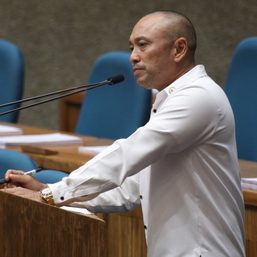SUMMARY
This is AI generated summarization, which may have errors. For context, always refer to the full article.

MANILA, Philippines – The series of House ethics committee proceedings against politician Arnolfo “Arnie” Teves Jr. ended in a humiliating expulsion from the chamber he once led as a deputy speaker.
But why did it come to this, and what will happen next?
Here are answers to some frequently asked questions.
Why was he expelled?
Teves was booted out of the House of Representatives on August 16, for disorderly behavior and violating its code of conduct. His attempts to seek political asylum in Timor-Leste and his continued absences in the chamber have been found to constitute abandonment of public office.
His colleagues also made him accountable for his indecent behavior online, triggered by a video of him dancing in boxer shorts and a white tank top.
While the ethics committee report also cited his designation as a terrorist by the Anti-Terrorism Council, that finding was stricken off on the spot in the plenary, according to House ethics committee chairman Felimon Espares.
Is his expulsion valid?
Yes, because the Constitution states that a House may remove any of its members through expulsion, upon concurrence by two-thirds of its members.
In Teves’ case, only 208 votes to expel were needed. He received 265 affirmative votes.
Did anyone oppose Teves’ expulsion?
Officially, no one opposed the motion to kick out Teves, but Davao del Norte 1st District Representative and former House Speaker Pantaleon Alvarez requested to the House majority a day after the session that his “no” vote be reflected in congressional records. It is unclear if he just failed to cast his vote on time, or if House staff committed a clerical error.
Forty-three other lawmakers did not cast a vote.
Three lawmakers from Makabayan bloc also sought abstention, which is technically different from not casting a vote. They insisted that the ethics committee report should not have cited the Anti-Terrorism Council resolution against Teves, saying it could be weaponized in the future against critical House members.

Can he appeal the decision?
Section 106 of the House Rules of Conduct states that a member who voted with the majority may move for the reconsideration of a motion on the same or succeeding session day. In Teves’ case, one of the 265 lawmakers may do it, but not Teves himself.
After that, the battle shifts to the courts, according to House Secretary General Reginald Velasco.
He said Teves may ask the Supreme Court to issue a temporary restraining order to prevent the expulsion order from taking effect.
“This is unprecedented. But normally, [in] Supreme Court cases like that, they will write a letter to us being one of the parties concerned. We will comment on that,” Velasco said on August 17.
Can he run again for office?
What we know for sure is that there’s nothing in the law that bars anyone in his situation from again holding public office. The Constitution and the current House rules are silent on the impact of expulsion on a lawmaker.
Velasco said the House may need to come up with another decision to determine whether the expulsion carries other punitive actions. He added that the final word may come from the Commission on Elections (Comelec).
Comelec Chairman George Garcia, in response, said on August 17: “There is no conviction by final judgement. Removal from office pertains only to the term and not as a perpetual disqualification to hold public office. The proceedings are administrative in nature.”
What happens to the congressional seat he vacated?
Speaker Martin Romualdez is expected to appoint a caretaker of Negros Oriental 3rd District. It could be, by tradition, a congressional representative from adjacent districts (either Jocelyn Limkaichong or Princess Rihan Sakaluran), or a lawmaker endorsed by party mates or local officials.
It could even be Romualdez himself, just like the past two times he assumed the said post when Teves was suspended.
Congress may still direct the Comelec to hold a special election, since the vacancy arose at least one year before the next regular elections in 2025, as per Republic Act 6645.
But Velasco acknowledged it may be difficult to do so because of time and budget constraints.
What did Teves say?
Teves’ camp called the outcome “hardly unexpected” because the proceedings were led by what it described as a “kangaroo court.”
Teves has insisted that the terrorist tag was “political persecution,” that he tried to participate in hearings virtually but was denied, and that his dance video on Facebook was protected by his right to free speech.
He has denied masterminding the assassination of Negros Oriental governor Roel Degamo, and leading a terrorist group. He said he cannot come home to face allegations against him due to supposed grave threats to his safety. – Rappler.com
Add a comment
How does this make you feel?





There are no comments yet. Add your comment to start the conversation.